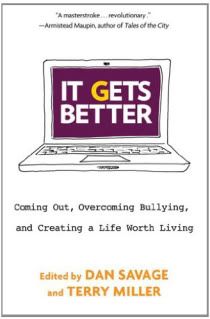 It Gets Better
It Gets Betterby Dan Savage and Terry Miller, ed.
Dutton, 2011
Last Tuesday, March 22, was the release date of the It Gets Better Project book and I was at the TriBeCa Barnes & Noble to see Dan Savage, Terry Miller and a few other contributors read from it. The project is probably the greatest thing Dan Savage has ever done. That's saying a lot, but I think it's the truth. It isn't the funniest, and wittiest or the most complicated but I think that Dan has gone from saving people's sex lives to saving their lives, period.
After the reading, I stood in line to get two copies of the book signed. When I got to the front of the line I told Terry and Dan that one copy was just for me, but the other copy was for a high school student I met a few years ago. I spent a year as an assistant ESL teacher in a high school and, during a tutoring session, my best student came out to me. At the time he was just out to his parents. No one in the school knew. I'm still not sure why he picked me to be the person he told. I may have, at one point, displayed a certain openness towards homosexuality and polyamory in a general way. He also may have seen me reading a novel by Jean Genet and gleaned that I was an ally from that. But I think the reason he told me is that I had no reason to care whether he was gay, one way or another. I was the low-risk option -- not really his peer, nor really his teacher (as an assistant teacher, I wasn't even empowered to give grades). For awhile, I was the only person he had to talk to about gay issues. We stayed in touch after I moved on. He still isn't completely out to his friends (and I worry about him sometimes), but some sort of progress is being made -- last summer he came to visit me in New York and we had a drink in the Stonewall Inn. After I finished telling Terry and Dan the story, Dan shook my hand and thanked me for being there for a gay kid at such an important moment. I was really proud at that moment (Dan Savage shook my hand!) but I also felt like I didn't deserve to be proud. I didn't really do that much. It isn't that hard to be there for someone when they need you.
The It Gets Better Project is all about being there for gay kids who have nothing else. The book (which is mostly transcripts of the It Gets Better videos that have been popping up on YouTube since last summer) aims to do that. It contains 103 versions of what is essentially the same story: The writer had a tough time as a kid in high school. They were harassed mercilessly, maybe by their own parents, maybe even to the point of considering suicide. But once they got out of high school they were able to find a community of people who accepted them and build a life for themselves better than anything they'd ever dreamed of. Some of the letter writers are famous (Barack Obama, Gene Robinson, Ellen, Michael Cunningham, Alison Bechdel, David Sedaris, Perez Hilton), some are just ordinary lesbian, gay, bisexual, trans and queer people. There's an essay in Spanish, and one in Arabic. There are cartoons. The evidence being offered is anecdotal but as the same story is repeated over and over again it takes on a certain statistical quality. When every story ends the same way, it becomes easier to believe that yours will too.
My only criticism of the book (and it hardly qualifies) is that, in text form, many of the messages aren't quite as powerful as they are on video. But whatever is lost by the individual messages is more than made up for by having so many of them packaged together. And it is undeniable that this message needs to be out there in as many different forms as possible, taking advantage of many different media. This book can go places the Internet videos can't, and vice versa. If the recent gay teen suicides have taught us anything it is that this message needs to be out there in as many forms as possible.
 The Other Side of Desire
The Other Side of Desire